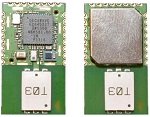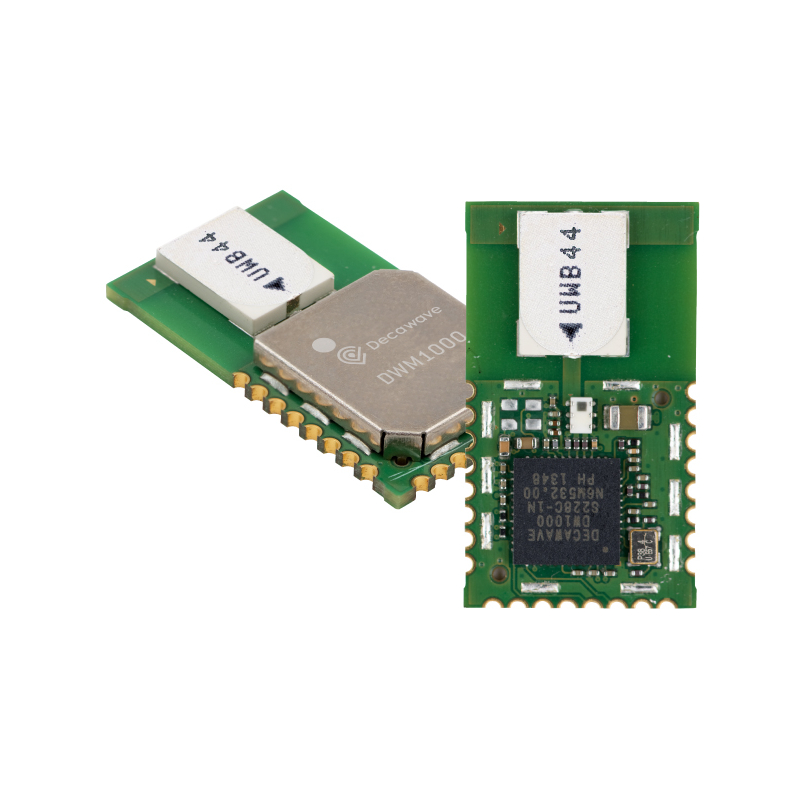decawave что это такое
Модуль от DecaWave для связи и точного определения местоположения внутри помещений
DecaWave выпустила на рынок первое решение для связи и точного определения местоположения внутри помещений – чип DW1000. Модуль DWM1000 с новым чипом позволит более широкой аудитории воспользоваться новыми технологиями от DecaWave. Благодаря новому модулю реализуется более точная и энергетически эффективная работа связи и сервисов определения местоположения внутри помещений.
Заказчики теперь могут просто и быстро интегрировать технологию в свои решения, сократив затраты на разработку и исключив риски, связанные с дизайном РЧ цепей. Модуль DWM1000 содержит всё необходимое для проектирования радиочастотных цепей. Новый чип, антенна, устройство согласования, кристалл ИС и пассивные компоненты – всё это размещено в 24-выводном корпусе с размерами 23 х 13 х 2.9 мм.
Высокий уровень интеграции был достигнут благодаря сотрудничеству DecaWave и LG Innotek – компанией, сосредоточенной на производстве модулей и подсистем. Устройство DWM1000 может использоваться даже в самых требовательных к размерам компонентов схемах портативных устройств.
Беспроводной трансивер модуля DWM1000 совместим со стандартом ультраширокой радиосвязи IEEE802.15.4-2011. Новое решение основано на чипе DW1000. Модуль позволяет осуществлять определение местоположения объектов в реальном времени с точностью до 10 см. Устройство реализует связь с обменом данными на скоростях до 6.8 Мбит/с. Модуль отлично подойдёт для сетей беспроводных датчиков (WSN). Радиус действия модуля достигает 290 м при прямой видимости и до 35 м – без неё. Решение способствует снижению стоимости систем и исключению использования дополнительных компонентов.
OUR TECHNOLOGY
Ultra-wideband (UWB) is a radio technology based on the IEEE 802.15.4a and 802.15.4z standards that can enable the very accurate measure of the Time of Flight of the radio signal, leading to centimeter accuracy distance/location measurement.
In addition to this unique capability, UWB offers data communication capability while using extremely little energy – enabling coin cell operation for years without needing to be recharged or replaced. By combining accurate location and communication, UWB also offers a new way of securely communicating over wireless, opening the door to new forms of secure transactions.
WHY UWB IS THE PREMIER LOCATION TECHNOLOGY
Unlike other technologies like Bluetooth or WiFi, which are being re-tooled for a new purpose, the physical properties of the UWB RF signal were specifically defined from the start to achieve real-time, ultra-accurate, ultra-reliable location and communication.
At Decawave, we also wanted UWB technology to become ubiquitous, and we added low-power and low-cost to the definition of our UWB chips.
TARGET APPLICATIONS
UWB technology capabilities have opened the door to a broad range of applications. As of January 2019, more than 7 million Decawave chipsets have been deployed by more than 40 different verticals, such as:
HOW UWB WORKS
UWB leverages Time of Flight (ToF), which is a method for measuring the distance between two radio transceivers by multiplying the Time of Flight of the signal by the speed of light. From this basic principle, UWB technology can be implemented in different ways based on the target applications needs: Two Way Ranging, Time Difference of Arrival (TDoA), or Phase Difference of Arrival (PDoA).
Time Difference of Arrival (TDoA) and Reverse TDoA
The TDoA method is very similar to GPS. Multiple reference points, called anchors, are deployed in a venue and are time synchronized. The mobile devices will beacon, and when an anchor receives the beacon signal it will timestamp it. The timestamps from multiple anchors are then sent back to a central location engine which will run multilateration algorithms based on Time Difference of Arrival of the beacons signals to compute the X, Y, Z of the mobile devices.
Pros:
Cons:
Two-Way Ranging (TWR)
The TWR method relies on two-way communication between two devices. As they communicate, the devices also measure the Time of Flight of the UWB RF signal between them. By multiplying the round trip time of the signal by the speed of light, and then dividing by 2, you can derive the actual distance between the two devices. If you apply the TWR scheme between two devices, you will get the distance (D) between the two devices. Based on the TWR scheme, you can also implement 2D or even 3D location by measuring the distance between your mobile tags and fixed beacons – this is called triangulation.
Pros:
Cons:
Phase Difference of Arrival (PDoA)
The PDoA method consists of combining the TWR scheme that delivers the distance between two devices with the measure of the bearing between the two devices. The combination of distance and bearing allows the calculation of the relative position of two devices without any other infrastructure. To do so, one of the devices carries two antennas and is able to measure the Phase Difference of Arrival of the RF signal.
Pros:
Cons:
THE IEEE STANDARD
The IEEE 802.15.4a is an international standard defining the IR-UWB physical layer. This standard was designed to deliver very high accuracy location while providing simultaneous two-way communication – up to 27Mbps – to collect sensor data and control actuators. This standard was initiated in 2005 and ratified in 2007 before being fully integrated in 2011. In 2018 the standard was re-opened in the form of 802.15.4z to add further security to the physical layer as UWB is now expected to be used as a secure transaction wireless technology by the automotive and mobile industries.
Decawave CTO and co-founder Michael McLaughlin was part of the team of engineers who created the standard. This early team had the vision to make every connected object “location aware,” as they believed that “answering the where” would add huge value to the success of applications like the Internet of Things (IoT).
LEARN MORE >
THE UWB ALLIANCE
The UWB Alliance is a global, not-for-profit organization that works to collectively establish UWB technology as an open-standards industry. It serves to promote large-scale deployments and protect the millions of installed devices globally from encroaching radio technologies. The UWB Alliance is currently comprised of founding members including Decawave, Hyundai, Kia, Zebra, Alteros, Novelda, and Ubisense.
This Alliance will drive growth through end-to-end, vendor-agnostic interoperability programs that will provide accurate location, navigation, tracking, security, imaging, sensing, and communication to IoT and Industry 4.0 applications across multiple industries.
LEARN MORE >
ABOUT DECAWAVE
Decawave develops semiconductor solutions, software, modules and reference designs that enable real-time, ultra-accurate, ultra reliable local area micro-location services. Decawave is headquartered in Ireland, with regional headquarters in California and China, and a presence in South Korea, France and Japan.
REGISTERED OFFICE
Adelaide Chambers, Peter Street, Dublin, D08 T6YA, Ireland
QUICK LINKS
EMAIL UPDATES
COPYRIGHT 2020 DECAWAVE | ALL RIGHTS RESERVED
DecaWave DWM1000 Приёмо-передающий модуль 3,5-6,5 ГГц
Сверхширокополосный приёмо-передающий модуль (антенна + радиочастотная схема + блок управления питанием + часы + интерфейс), поддерживает 4 RF-диапазона от 3,5 до 6,5 ГГц, скорость передачи данных: 110 кбит/с, 850 кбит/с и 6,8 Мбит/с, питание: 2,8-3,6 В, корпус с 24 боковыми зубчатыми контактами, размер: 23х13х2,9 мм.
Производитель DecaWave Раздел каталога Приемопередающие модули Артикул DWM1000
Цены, техническая информация и изображения представлены для ознакомления. Завод-изготовитель может изменять характеристики и внешний вид изделия без уведомления. Актуальную информацию запрашивайте у наших менеджеров.
6.5GHz
Англ.: Serial Interfaces
Англ.: Supply Voltage.
3.6 V
Англ. Mounting Type
Англ. Package / Case
Рабочая температура (англ. Operating Temperature) – это диапазон температур, при которых компонент или устройство может нормально функционировать.
Формулы связи шкалы Фаренгейта и Цельсия:
([°F] – 32) : 1,8 = [°C]
[°C] × 1.8 + 32 = [°F]
Самовывоз
Вы можете забрать товар самостоятельно в нашем офисе по адресу г. Санкт-Петербург, проспект Шаумяна, 10, к1.
Доставка по Санкт-Петербургу
Наша компания осуществляет собственную курьерскую доставку по Санкт-Петербургу в пределах КАД. Доставка по Ленинградской области согласовывается дополнительно.
Вы также можете воспользоваться услугами специализированных курьерских служб по их тарифам.
Доставка по России
Доставка товаров по России осуществляется посредством выбранной Вами транспортной компании (ТК) и по её тарифам.
Подробную информацию о доставке смотрите в соответствующем разделе нашего сайта: подробнее о доставке.
Вас также может заинтересовать
KIT 2WAY RANGE BASED ON EVB1000
Срок поставки до нашего склада указывается в коммерческом предложении, а также в счёте на оплату. Он исчисляется с момента поступления денежных средств на наш расчетный счет.
В среднем срок поставки заказных компонентов составляет 2-3 недели, однако, на некоторые товары он может сильно отличаться от указанного выше.
В каждом конкретном случае Вы будете знать срок поставки заранее, он зависит от наличия требуемых компонентов на мировых складах, сроков производства, скорости формирования сборных грузов и прохождения таможенных процедур.
Большинство электронных компонентов, предлагаемых нами, поставляется с мировых складов поставщиков или производителей. По этой причине доставка радиодеталей в сжатые сроки очень затруднительна.
Отправляя любую форму на сайте, Вы соглашаетесь с политикой конфиденциальности и условиями пользовательского соглашения данного сайта.
Обращаем Ваше внимание на то, что данный Сайт носит исключительно информационный характер и ни при каких условиях информационные материалы и цены, размещенные на Сайте, не являются публичной офертой, определяемой положениями Статей 435 и 437 Гражданского кодекса РФ.
Application Notes
At Decawave we strive for customer satisfaction and so we have written a comprehensive set of application notes to assist our customers in developing their UWB products. The following application notes explain the DW1000 expected performance and capabilities and how to optimise these during design, prototyping, and production
APPLICATION INFORMATION
Describes in detail the concepts of Real Time Location Systems (RTLS) and Wireless Sensor Netorks (WSN).









 EVALUATE OUR TECHNOLOGY
EVALUATE OUR TECHNOLOGY  KICK-START YOUR DESIGN
KICK-START YOUR DESIGN  DESIGN YOUR PRODUCT
DESIGN YOUR PRODUCT